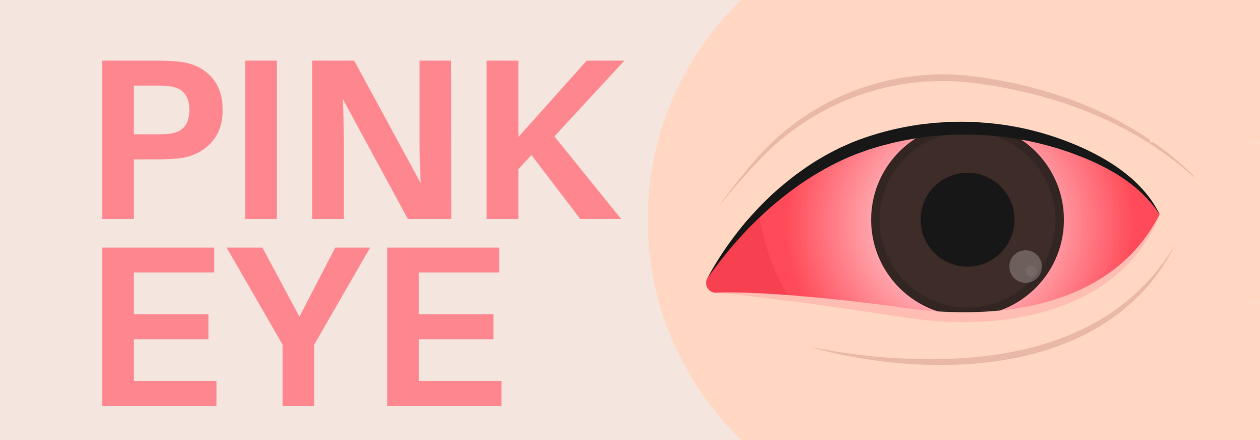“I think I have pink eye!”- I have been getting a lot of calls like this lately! It is just the time of year where all kinds of things are getting spread around. I wanted to talk today about what exactly is “pink eye” and how to treat it.
First, the medical term for “pink eye” is actually conjunctivitis, which is the swelling or inflammation of the conjunctiva. So, the conjunctiva is the clear tissue that lines the inside of the eyelids and the white part of the eye. Now, there are many different causes of conjunctivitis, and they may be infectious or non-infectious.
3 Types of Conjunctivitis
- Allergic conjunctivitis
- This typically happens to people who suffer from seasonal allergies. So, it is caused by coming into contact with an allergen that triggers an allergic reaction in the eyes.
- Giant papillary conjunctivitis is a form of allergic conjunctivitis that is caused by the constant presence of a foreign body in the eye. I most commonly find this in contact lens wearers.
- Infectious conjunctivitis
- Bacterial conjunctivitis is most often caused by staphylococcal or streptococcal bacteria from your own skin or respiratory system. Therefore, hysical contact with people, poor hygiene, or using contaminated eye makeup can cause the infection.Viral conjunctivitis is commonly caused by viruses associated with the common cold. It can develop from exposure to the coughing or sneezing of someone with an upper respiratory tract infection or if you are sick and the virus spreads along your own mucous membranes.
- Ophthalmia neonatorum is a severe bacterial conjunctivitis that can happen in babies. If not treated immediately it can lead to vision loss. It is caused by exposure to chlamydia or gonorrhea while passing through the birth canal. Nurses now apply medication to babies’ eyes prophylactically.
- Chemical conjunctivitis
- This is caused by irritants like air pollution, chlorine in pools, and exposure to noxious chemicals.
Pink Eye Symptoms
Now, symptoms can vary depending on what the cause of the conjunctivitis is. So, allergic symptoms are watery discharge with mild redness and itching. Now, with bacterial infections, it usually looks worse than it feels and there is almost always a green/yellow discharge with red and swollen “crusty” eyelashes. Lastly, viral infections are usually more painful and cause a sandy feeling. Being sensitive to light is another sign of viral infections.
Pink Eye Treatment
Treatment depends on the cause of the conjunctivitis.
- Allergic conjunctivitis
- Avoid the irritant. Cool wash cloth or eye mask and some eye drops can help with discomfort in milder cases. However, if more severe, I consider NSAIDs, allergy eye drops, and steroid eye drops. I may also recommend oral allergy medications.
- Infectious conjunctivitis
- Bacterial conjunctivitis is usually treated with antibiotic eye drops or ointments. It usually will start to improve after 3-4 days but the full course of the antibiotics needs to be taken to prevent a recurrence.
- Unlike bacterial conjunctivitis, viral conjunctivitis cannot be cured with medications. Just like with the common cold, it has to “run it’s course”, which can take 2-3 weeks. Symptoms can be relieved with a cool wash cloth or eye mask and eye drops. If symptoms are severe, I consider steroids but know it will not shorten the infection.
- Chemical conjunctivitis
- I want you to start washing the eye carefully with saline. I may also be considering prescription drops in this case. Now, severe chemical injuries are emergencies and need to be taken seriously. If a chemical spills into your eye, flush it for several minutes with a lot of water and then go to the emergency room.
- To stop the spread of infection, practice good hygiene
- Don’t touch your eyes
- Wash your hands
- Discard eye makeup
Conclusion
So, if you think you have pink eye either from an infection cause or not, you can always reach out to your local eye doctor to get some answers. Also, if it is allergies you can check out that blog post or if you think it is from your four legged friend check out this post. Now, if you want to hear about a specific topic please leave a comment below. As always, thank you for reading and have a great day!
